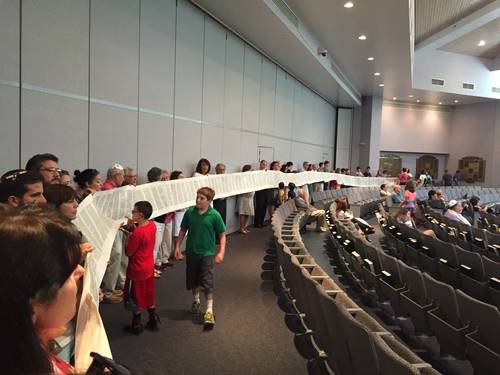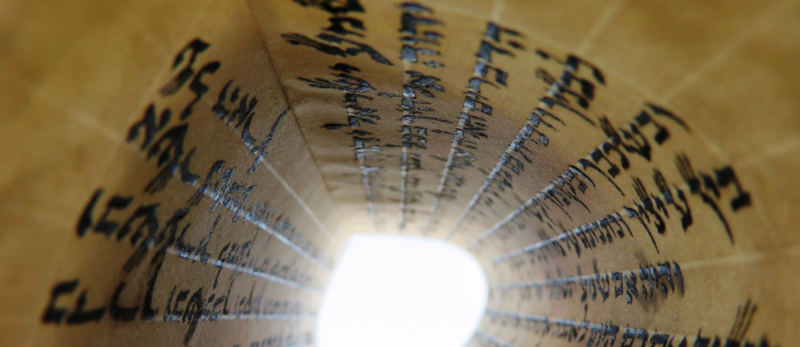We celebrate Sh'mini Atzeret and Simchat Torah immediately after Sukkot, a joyful day in which we rejoice in the completion of the annual Torah reading and reinforce Torah as one of the foundations on which we create our lives.
CELEBRATE AT TEMPLE SHALOM
 In celebration of Simchat Torah, the Torah scrolls are removed from the ark and carried or danced around the temple seven times as part of the festival.
In celebration of Simchat Torah, the Torah scrolls are removed from the ark and carried or danced around the temple seven times as part of the festival.
At Temple Shalom for Simchat Torah, with the help of the entire congregation, we unfurl the entire scroll. Cantor Azu reads the the final portion of the fifth book of the Torah, D'varim (Deuteronomy), and then dashes across the Sanctuary to read the first section of Genesis, or B'reishit. This custom illustrates the cyclical aspect of the Jewish people's relationship with Torah reading
Sh'mini Atzeret and Simchat Torah were formerly two distinct holidays (a day of reflection after the end of Sukkot and a celebration of Torah the following day). However, in Israel and Reform congregations, which usually celebrate one holiday rather than two, Sh’mini Atzeret is observed concurrently with Simchat Torah.
The symbolic message of the customs associated with Simchat Torah emphasize that the represents our heritage and history, and links Jews to each other over many generations. The words recited at the end of reading each book of the Torah inspire and represent this history: Chazak, chazak, v’nitchazeik. “Be strong, be strong, and we will strengthen each other,” building a living Judaism through study, action, and commitment.
Sh’mini Atzeret, Hebrew for “eighth-day convocation,” is the name given to the day after the seven days of Sukkot. Leviticus 23:36 proclaims: “On the eighth day you shall observe a holy convocation.”
Sh’mini Atzeret, which occurs directly after Sukkot is a day on which Jews recite a special prayer for rain in the year to come – quite appropriate in view of Sukkot’s agricultural motif. This prayer is retained in the worship service until Passover. This "eighth day" of Sukkot, Sh’mini Atzeret, is a separate occasion in its own right. Although it shares some of the rituals of Sukkot, there are some differences as well. Along with the addition of the blessing for the rain, the lulav and etrog are no longer shaken in the sukkah, the blessing for dwelling in the sukkah is no longer said, and the prayer is said in synagogue.







